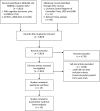Do statins impair cognition? A systematic review and meta-analysis of randomized controlled trials
- PMID: 25575908
- PMCID: PMC4351273
- DOI: 10.1007/s11606-014-3115-3
Do statins impair cognition? A systematic review and meta-analysis of randomized controlled trials
Abstract
Background: In 2012, the United States Food and Drug Administration (FDA) issued a warning regarding potential adverse effects of HMG-CoA reductase inhibitors (statins) on cognition, based on the Adverse Events Reporting System and a review of the medical literature. We aimed to synthesize randomized clinical trial (RCTs) evidence on the association between statin therapy and cognitive outcomes.
Methods: We searched MEDLINE, EMBASE, and Cochrane CENTRAL through December 2012, and reviewed published systematic reviews of statin treatment. We sought RCTs that compared statin treatment versus placebo or standard care, and reported at least one cognitive outcome (frequency of adverse cognitive events or measurements using standard neuropsychological cognitive test scores). Studies reporting sufficient information to calculate effect sizes were included in meta-analyses. Standardized and unstandardized mean differences were calculated for continuous outcomes for global cognition and for pre-specified cognitive domains. The main outcome was change in cognition measured by neuropsychological tests; an outcome of secondary interest was the frequency of adverse cognitive events observed during follow-up.
Results: We identified 25 RCTs (all placebo-controlled) reporting cognitive outcomes in 46,836 subjects, of which 23 RCTs reported cognitive test results in 29,012 participants. Adverse cognitive outcomes attributable to statins were rarely reported in trials involving cognitively normal or impaired subjects. Furthermore, meta-analysis of cognitive test data (14 studies; 27,643 participants) failed to show significant adverse effects of statins on all tests of cognition in either cognitively normal subjects (standardized mean difference 0.01, 95% confidence interval, CI, -0.01 to 0.03, p = 0.42) or Alzheimer's disease subjects (standardized mean difference -0.05, 95% CI -0.19 to 0.10, p = 0.38).
Conclusions: Statin therapy was not associated with cognitive impairment in RCTs. These results raise questions regarding the continued merit of the FDA warning about potential adverse effects of statins on cognition.
Figures
Comment in
-
Capsule commentary on Ott et al., do statins impair cognition? A systematic review and meta-analysis of randomized controlled trials.J Gen Intern Med. 2015 Mar;30(3):347. doi: 10.1007/s11606-014-3158-5. J Gen Intern Med. 2015. PMID: 25623296 Free PMC article. No abstract available.
-
ACP Journal Club. Review: Statins do not increase adverse cognitive effects in patients with or without initial cognitive impairment.Ann Intern Med. 2015 May 19;162(10):JC6. doi: 10.7326/ACPJC-2015-162-10-006. Ann Intern Med. 2015. PMID: 25984879 No abstract available.
References
-
- FDA. FDA Drug Safety Communication: Important safety label changes to cholesterol-lowering statin drugs. 2-28-2012. 11-28-2012. Ref Type: Internet Communication
-
- Benito-Leon J, Louis ED, Vega S, Bermejo-Pareja F. Statins and cognitive functioning in the elderly: a population-based study. J Alzheimers Dis. 2010;21(1):95–102. - PubMed
Publication types
MeSH terms
Substances
Grants and funding
LinkOut - more resources
Full Text Sources
Other Literature Sources
Medical



